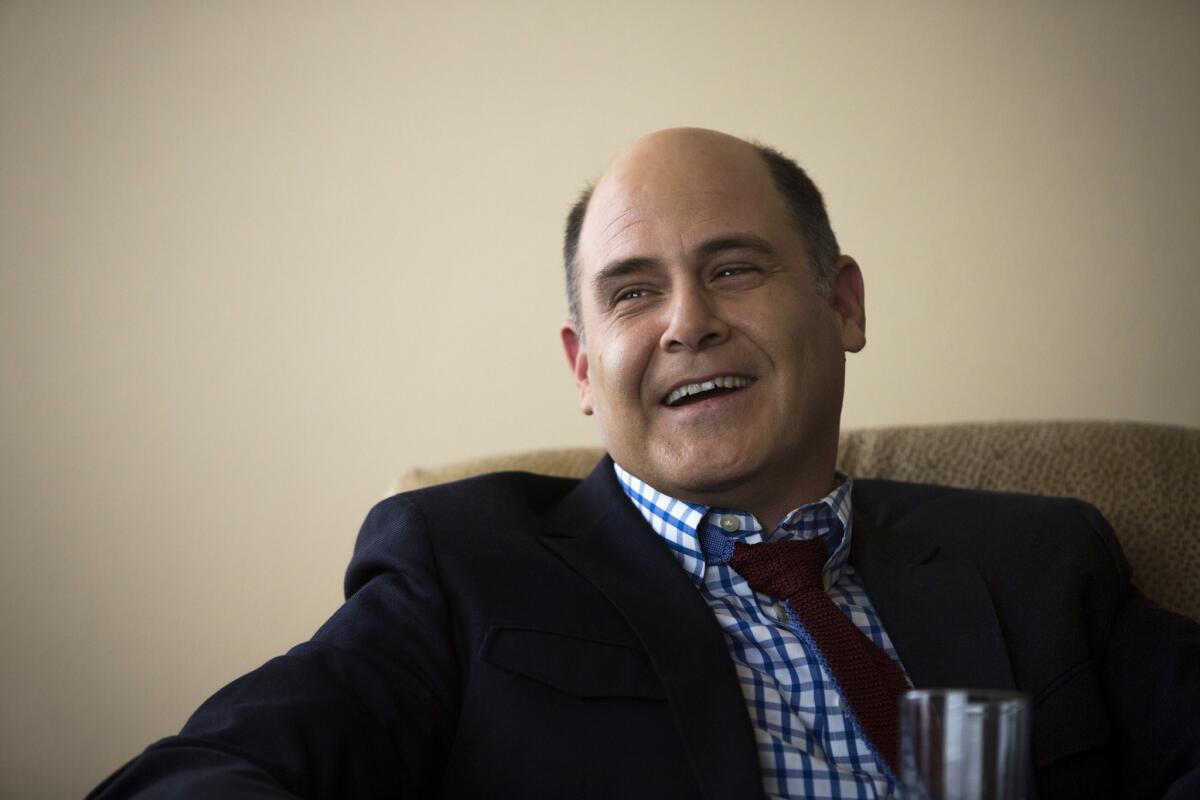Matthew Weiner on reworking ‘Are You Here,’ ending ‘Mad Men’

One of the key shows people point to when discussing the relatively recent surge in quality on television is “Mad Men.” Thematically rich, visually stylized and emotionally evocative, the show uses what creator Matthew Weiner describes as “the traditional instruments of cinema” to make the small-screen leap to larger life.
So at a moment when “TV is the new cinema” or “TV is better than movies” have become such frequent media mantras, why has Weiner gone in the opposite direction to make a feature film?
“Are You Here,” though not technically his debut film — he directed and starred in the little-seen 1996 film “What Do You Do All Day” — is his first major project since the launch of the series that has won him a shelf-full of Emmys.
Weiner’s move comes at a time when many filmmakers and actors are going the other way. Just recently it was announced that director Alejandro González Iñárritu, whose upcoming “Birdman” is one of the most anticipated fall films, will be making his first entry into television for the cable network Starz. And there is the continuing Soderbergh Situation, as after his declarations of retiring from cinema, Oscar winner Steven Soderbergh recently directed, shot and edited all 10 episodes of Cinemax’s “The Knick,” with word he will be back for Season 2.
In “Are You Here,” written and directed by Weiner, small-market television weatherman Steve Dallas (Owen Wilson) and unstable self-styled author Ben Baker (Zach Galifianakis) are best friends, bonded by time and a mutual love of losing themselves to getting loaded. After Ben’s estranged father dies, he comes into a substantial inheritance, leading to Steve cleaning up by getting sober and Ben straightening out by going on mood-stabilizing medication.
The film, opening Aug. 22 and released by Millennium Entertainment, has a specific tone — “a comedy with reality in it,” is how Weiner describes it. Both actors toy with their on-screen personas — Wilson the lackadaisical lothario and Galifianakis the lost goofball, turned into more responsible adults. The film takes what might be the premise for a buddy-based sitcom and transforms it into a vehicle for an emotionally nuanced look at friendship, growth and gratitude.
For Weiner, the distinctions and divisions between television and film that outsiders might get hung up on stem from engines more economic than creative. “I have a less artistic view of that whole shift, when I hear about TV being the new whatever-it-is,” he said. “I’m here to tell stories; I don’t even think about it.
“That’s all happening in a world of hype that’s unrelated to anything. It really is. There was an economic boom in TV is what happened. These small channels that were in a lot of homes but couldn’t get any attention could raise a lot of revenue with shows that were very specific. At the same time, in a parallel universe, the movie business has gone so broadly international that it feels like silent film.”
For a recent interview, Weiner was in the longtime production offices for “Mad Men” near downtown L.A., where he is overseeing post-production on the final episodes of the show. (He expects to be finished in October, with the remaining episodes closely guarded until airing next year.) He proudly points out a framed blow-up of the venerated French film journal Cahiers du Cinéma with “Mad Men” actress January Jones on the cover.
Weiner used much of the same creative team he has been involved with on “Mad Men” on the film, though instead of a moody period drama, they were creating a bright, contemporary comedy. The film’s creative back story also winds its way around “Mad Men.” He wrote the pilot for “Mad Men” before being hired as a writer on “The Sopranos” and then wrote the script that became “Are You Here” in between two seasons of his work on that landmark mobster drama.
Once “Mad Men” became a success, he struggled to find the time and resources to make the movie. Ultimately he had to shoot the movie, go off and do Season 6 of “Mad Men,” and then return after that to edit and finish the film, racing to get ready for its premiere at last year’s Toronto International Film Festival.
Though he says it didn’t feel as bad to him as some have depicted, “Are You Here” received a muted response when it first premiered last fall. (It was then called “You Are Here.”) Weiner now concedes the film was unfinished. He since has stripped away some of the music, reshaped the narrative and made the film a few minutes longer. The revisions have been to embrace the film’s specificity of tone, instead of, as he put it, “trying to an turn an orange into an apple because I was unsure about loving oranges.”
The processes of TV and film are certainly different. Movies are designed to end, where television series are created to continue. For Weiner, who said he uses writing for exploration and discovery, creating something with the definite shape of “Are You Here” has been different from the ongoing process of “Mad Men.”
“Ending the series — which now I’ve done at least on paper, I haven’t finished editing the last episode — it was a total revelation to me,” said Weiner. “This is not part of writing TV, resolving things. You are propelling yourself into next season, the next episode. You can kill a character off or have someone leave the show, but it isn’t the same as ending the entire thing. And the movie is its own world. That was a big difference for me.”
It is worth noting that another fabled show runner, David Chase, creator of “The Sopranos,” also followed up his groundbreaking accomplishments on television by making a feature film, “Not Fade Away.” Though the film was lost in the shuffle of the year-end release scrum of 2012, it is a beguiling work of nostalgic reflection and emotional resonance.
In its portrayal of people rediscovering themselves, “Are You Here” explores the provisional victories people face along their way. “There is a happy ending, but it has the sense of being like real life, you don’t know if it will stick,” he said. “It’s like, this is good for now and it’s better than it was.”
Even with the title change and revisions, his film may have a hard time overcoming the perceptions created by its muddled unveiling. And what next from a man who has rewritten the rules of television and now tried his hand at moviemaking? Weiner hopes to soon stage a recently written play.
More to Read
Only good movies
Get the Indie Focus newsletter, Mark Olsen's weekly guide to the world of cinema.
You may occasionally receive promotional content from the Los Angeles Times.











